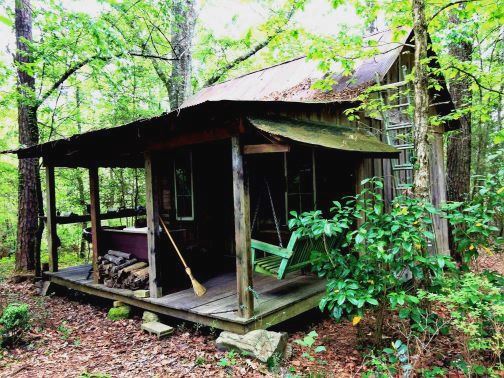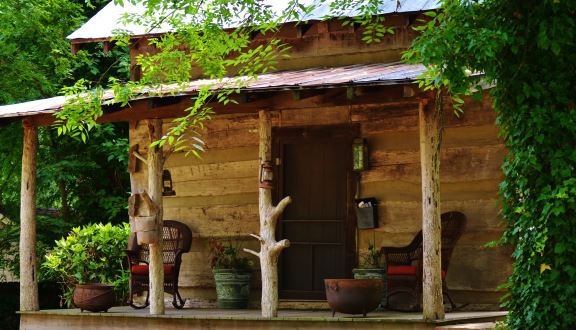
The Arkansas Traveler
by Gary Wright
“Arkansas, Arkansas, ’tis a name dear.
‘Tis the place I call “Home, Sweet Home.”
—Eva Ware Barnett
Arkansas is a land filled with mysticism and magic; history and tradition; calm with the folklore of yesteryear, yet bustling with today’s energy and commerce. Never fully understood nor quite appreciated by the rest of America, it remained locked in an enigma of its own backwaters for so long that the rest of the country assumed the worst. Arkansas has been denigrated for its backwardness, its culture, and its own proudness. It has been forever pictured as a bunch of moonshiners living in the mountains, marrying their kin, and keeping civilization at bay with a blunderbuss shotgun.
I was raised in the northeast section of Arkansas on a small cotton farm in an area near, but not quite in, the Mississippi Delta. Outside of Paragould, Arkansas runs a ridgeline known as Crowley’s Ridge. It’s an unusual geological formation that rises a mean 350 feet above the plain of the Mississippi River in a 150-mile line from southeastern Missouri to Helena, Arkansas. So, you see, it’s not quite a mountain, but certainly not a delta—more like a hill. It’s a ridge, and we who lived there were known as ridge runners. They say that by continually going around the ridges the same way, one leg would become shorter than the other. I fixed that by changing directions on alternate days.
“Far and far away down in Arkansas,
There lived a squatter with a stubborn jaw.
His nose was ruby red and his whiskers gray.
And he would sit and fiddle all the night and all the day.
Came a traveler down the valley, asked if he could find a bed.
Yes, try the road, the kindly squatter said.
Then, could you point me out the way to find a tavern or an Inn?
Quite a little piece, I reckon, tho I’ve never been!
And, when the rain came down on the cabin floor,
The squatter only fiddled all the more.
Why don’t you mend your roof, said the traveler bold.
How can I mend my cabin when the rain is wet and cold?
Squatter, pick a sunny morning when the air is dry and nice,
Patch up your cabin, that is my advice.
The squatter shook his hoary head, and answered with a stubborn air,
Cabin never leaks a drop when days are bright and fair.”
(Lyrics by the Arkansas State Song Selection Committee, © 1947)
This was the official state song from 1949 until 1963. It was determined by state officials who were trying to move the state into the economic future that it tied the state too much to its colorful past. It was with much anguish that the song changed when the officials determined that the colorful history wasn’t colorful at all — just backward and ignorant. You see, sometimes it’s difficult to tell the difference. Hats off to the service of ones who can tell that difference and will learn from it. I learned that bit of advice from the Arkansawyerin, the ‘Arkansas Traveler.’
The song is pretty straightforward, in that it tells of an uncultured hillbilly boob matching wits with a (Yankee) fellow traveling through rural Arkansas. The country bumpkin seems to get the better of the cultured outsider. The song stems from a much older rendering with different tunes, lost in the shrouds of history. The ditty always features a fiddle-playing country simpleton who good-naturedly bests the ‘fureigner.’ In the mid-1800s, the song found receptive audiences far and wide at variety shows and in vaudeville and minstrel shows. It was even recorded in 1963 by Jerry Garcia of Grateful Dead fame.

The biggest problem, as seen through the eyes of Arkansas promoters, was that no matter how often or how much the hillbilly in the song bested the ‘flatland tourister,’ he was still and always a hillbilly. Hillbillies are always welcome and, initially, quite beloved. But, after a time, the ‘antical’ and quaint ‘hillbilly’ becomes just an annoying and ‘laffable ‘dummy. The song became popular as a comic background song in ‘Merrie Melodies’ and ‘Looney Tunes’ cartoons on the big screen in the 1930s and 40s. Because of that quaint tune, Arkansas, in a lot of ways, became frozen in time for many years.
Having served its useful life, and much more so, in my opinion, finally, in 1963, the song was replaced as the Arkansas state song by a more updated and more urbane “Oh, Arkansas.” At last, perhaps the rest of the country would let Arkansas officially join the 21st century with all the rest of her sister States, and we could laugh along with Arkansas and not at her.
Arkansas is near the state of Kansas, but the two are not pronounced alike. Arkansas is pronounced ‘Arkansaw,’ while the latter is pronounced ‘Can-sass.’ There is an actual Arkansas state law prohibiting the spelling of Arkansas as ‘Arkansaw,’ even though it’s still pronounced ‘Arkansaw.’ I felt that I should point that out. It makes me feel better knowing that I won’t be responsible for someone’s incarceration for mis-spelling Arkansas, that’s really Arkansaw.
In honor of all the Merrie Melodies, let’s bid a fond farewell to those ‘good old days’ of the moonshine-making Arkansaw hillbillies, their lazy, Blue Tick Hounds forever idling by the cabin door, and ‘flat land turisters’ who are forever making fun of this not-so-quite-idyllic notion. Upon closer introspection, one usually finds that the ‘good old days’ weren’t always so good.
Photos: Deborah Fagan Carpenter


